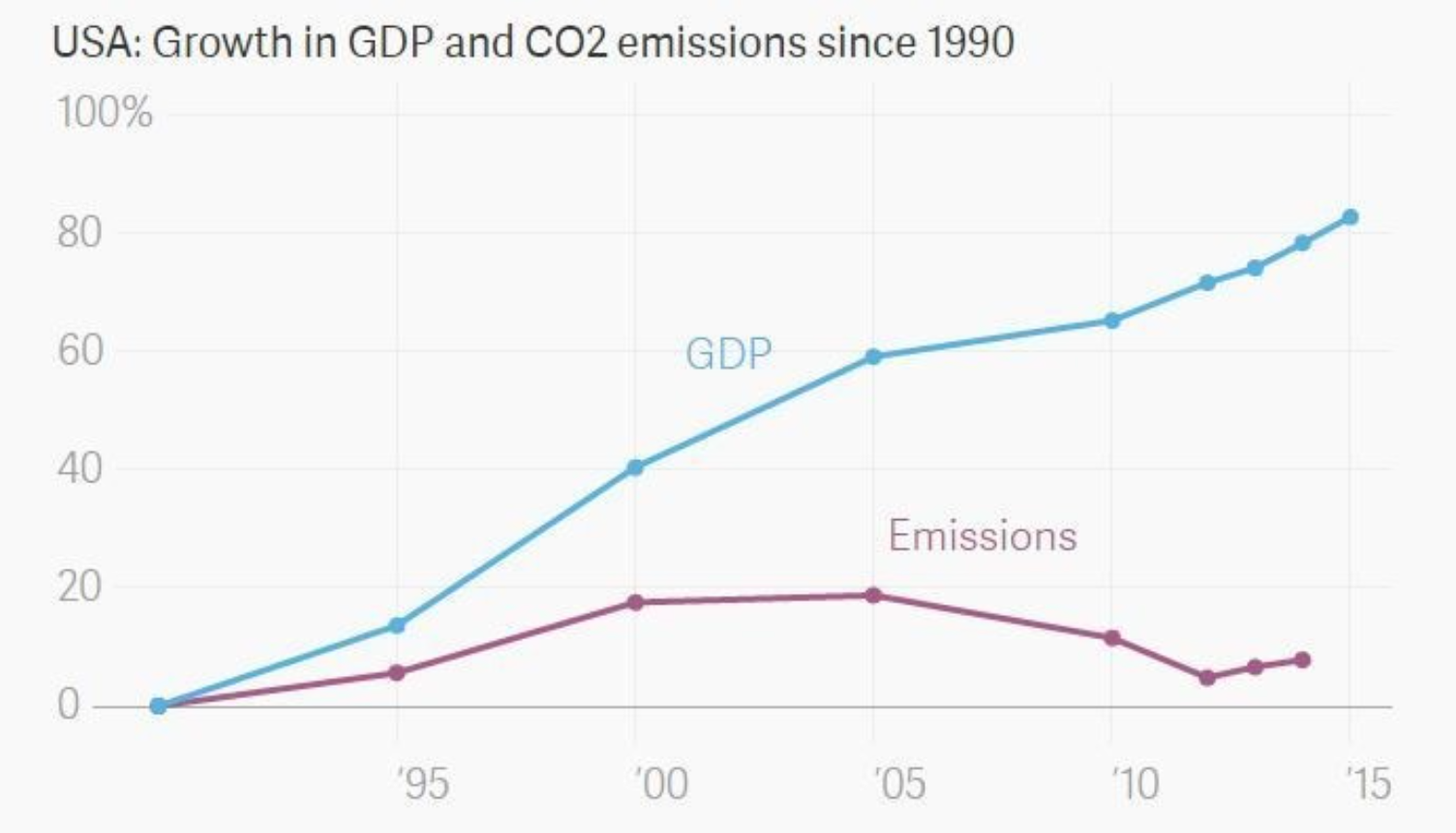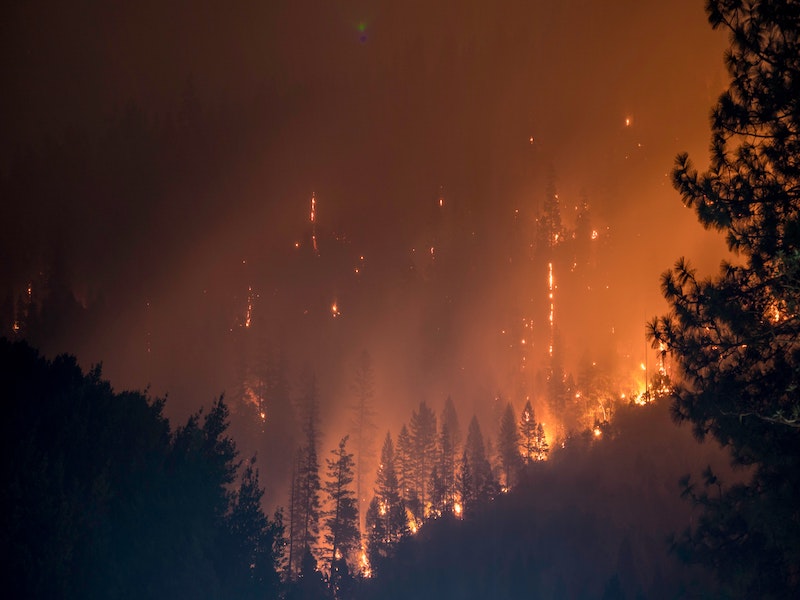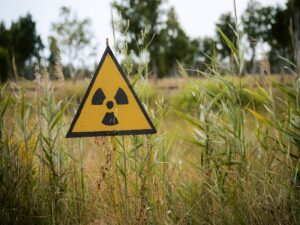The latest report by the Intergovernmental Panel on Climate Change (IPCC) has told us for the sixth time what everyone is increasingly seeing before their eyes. Human behaviour is creating aggressive changes to the climate. As scientific understanding of the climate crisis increases, so does the alarm at the future that lies ahead. You would think that with each publication, governments would act on the scientific evidence and do all they can to reduce emissions. The reality is the opposite has happened.
When the first IPCC report was published in 1990, just over 20 billion tonnes of CO2 was released into the atmosphere. Fast forward to the fourth report published in 2007, and CO2 emissions were closing in on 30 billion tonnes.

The International Energy Agency (IEA) estimates CO2 emissions will hit 33 billion tonnes this year. Why are emissions increasing when the IPCC reports provide such an alarming picture of a future where runaway climate change is possible?
Decoupling
The graph above doesn’t just show emissions increasing from 1990 to 2019. What it shows is that within advanced economies, carbon emissions have remained stable. And after a peak in the early 2000s, there has been a slow reduction. This is happening due to a decoupling between economic growth and carbon emissions.
The two have been historically intertwined. As an economy grows, so does its need for energy. Energy needs predominantly come from energy-rich sources of fossils fuels. And so, an undesired consequence of increasing energy demands is carbon emissions.
But as economies have become more advanced, they have been able to limit the carbon emissions that come with economic growth. The US is a case in point. As the graph below shows, while its economy continues to grow, the economy’s carbon intensity reduces. While this is good news, due to the fact the economy has grown so much, it does mean that in real terms, US emissions are higher now than they have ever been.

The dramatic increases in carbon emissions since 1990 are the result of developing countries going through the process of industrialisation.
Industrialisation is an energy-intensive process. And the rapid growth of countries such as China and India have led to vast increases in CO2 emissions. Industrialising countries are ravenous in their energy demands. And coal, while emitting the most CO2 of any fossil fuel, provides a cheap, readily available source of energy.
The energy intensity of advanced economies may be decreasing, but those reductions are being outweighed by the increasing energy intensity of developing countries.
With more and more counties going through the process of industrialisation, the Energy Information Administration (EIA) predicts global energy demands are set to increase by 50% in the next 30 years. While the EIA predicts renewables will make up 28% of energy consumption (from 18% today), 68% will still come from fossil fuels.
Everyone wants the same thing
Clearly, no one wants a future where runaway climate change becomes a possibility. But while no one wants the problem, everyone aspires to a better life, which is causing the problem.
Here lies one of the ultimate dilemmas we face in transforming towards a low carbon economy. Those calling for an immediate end to the use of fossil fuels, usually middle-class people in the West who enjoy a certain privileged lifestyle, fail to recognise that everyone else in the world wants the lifestyle that they enjoy.
Inherent in those calls is a major moral dilemma. Advanced economies are responsible for the vast majority of historical emissions. These emissions are an outcome of industrialisation, which has allowed people in the West to lead privileged lifestyles.
The idea that developing countries will not be allowed to do the same is beyond a contradiction; it is morally reprehensible.
So as much as no one wants it, the reality we have is that emissions will continue to increase. This is because, in the short term, governments are more concerned with creating economic growth and social prosperity than they are with dealing with a crisis that doesn’t yet feel like a crisis.
A wicked problem
That’s why as damning and terrifying as the IPCC’s latest report is, it won’t change the trajectory we are currently on. This is a moral and psychological challenge, as much as it is a political and economic one. The climate affects everyone and everything, and it’s the all-encompassing nature of the problem that makes it so ghastly to deal with.
Everyone wants a better life. Invariably, a better life translates into consuming more goods, increasing an individual’s carbon footprint.
A consequence of civilisation as we know it is carbon emissions. The two are interconnected. We will never live in a time where civilisation is detached from emissions; that is an unrealistic pipedream.
Net-zero is a realistic target, but net-zero doesn’t mean zero emissions. It means there is a balance between carbon emitted into the atmosphere and carbon removed from the atmosphere.
Social progress brought about through the democratisation of technology is positive. The global middle class is expected to grow to 5.3 billion people by 2030, which is a magnificent achievement. It means that people have enough income to meet their needs while having surplus income to buy consumer goods.
An unintended consequence
But social development comes at a terrible, unseen cost.
It would be great if we could have the progress without the environmental impact, but the tragedy that lies at the heart of the trajectory we are on is that carbon emissions are an inevitable, undesired consequence of social progress.
The fact social progress is interlinked with increasing carbon emissions presents a problem no one wants to accept. To solve the climate crisis, it’s impossible for everyone to lead the lifestyle currently being led by the rich and middle class in advanced economies.
Inherent in the challenge humanity faces is that the rich will not be willing to give up their lifestyles. While the poor want to increase their well-being. The outcome is going to be increasing emissions which will accelerate the problem.
The bitter reality is that we have unintentionally created a trap with good intentions. The trap has enabled us to increase social wellbeing beyond anything imaginable to our ancestors. And it is those increases in well-being that have put us out of balance with the environment we depend on for life itself.
Civilisation as we know it can’t continue. We either accept that fact and transform civilisation, so it works in harmony with the natural world. Or, we continue on the same path, and we will be forced to adapt as the natural world around us goes through a process of radical change. We can control our destiny if we choose the right path. As things stand, we‘re in for an uncertain future.




Absolutely agree that first world consumers who have to lower their expectations and consume less if 8 billion humans are to survive climate disaster.
Where I disagree is with your argument that the US has reduced its emissions. Emissions may be down slightly on the land mass of the US, but as as most manufacturing is outsourced to cheap/slave labour countries like China, India, Bangladesh, Vietnam, Cambodia etc and raw materials are extracted, by force or threat of force, from Africa and South America etc those emissions should be added to the US, Britain, EU.
As you rightly say, we have to work in tandem with nature to supply all people’s on this planet with the requirements for a decent life.
Climate disaster doesn’t discriminate and Capitalism cannot be part of the solution